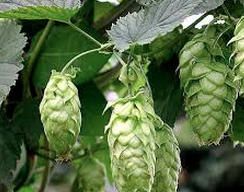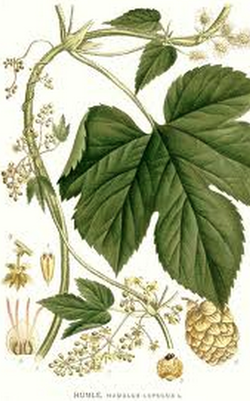 Humulus lupulus, Hops Humulus lupulus, Hops We can think of at least 180 great forest garden & perennial crops for cold climate Sweden. Want to hear about them? Over the course of the next year we will profile 5 a week on the blog. Perennial plants and crops offer a low energy, oil & resource input based foundation for future-proof agricultures. By default if an agriculture is to be called regenerative the bottom line is that it must be soil building, not soil depleting. Relentless deep tillage & poor soil husbandry (wifery?!) contributes to the majority of the 24 billion tons of topsoil lost every year on planet water. We are going to be focused on holistic polyculture grazing and perennial production at ridgedale over most of the site as this represents the most effective way to restore our degraded landscape, produce high value produce and ensure the future resource base we are managing holistically for in our decision making.  Genus Humulus Species lupulus Common Name hops Form herbaceous vine Habit clumping Origin Europe Light sun to part Moisture mesic Edible shoots, beverages Humulus lupulus (common hop or hop) is a species of flowering plant in the Cannabaceae family, native to Europe, western Asia and North America. It is a dioecious, perennial, herbaceous climbing plant which sends up new shoots in early spring and dies back to a cold-hardy rhizome in autumn. Strictly speaking it is a bine rather than a vine, using its own shoots to act as supports for new growth. H. lupulus is the main ingredient of many beers, and as such is widely cultivated for use by the brewing industry. The fragrant flower cones impart bitterness and flavor, and also have preservative qualities. It contains myrcene, humulene,xanthohumol, myrcenol, linalool, tannins, and resin. Skin contact with the plant causes dermatitis in sensitive people, with Hops dermatitis has long been recognized. Not only hands and face, but legs have suffered purpuric eruptions due to hop picking. Although only 1 in 3,000 workers is estimated to be treated, one in 30 are believed to suffer dermatitis. Dislodged hairs from the plant can irritate the eyes. Sedative effect may worsen depression. Avoid during pregnancy (due to antispasmodic action on uterus). Avoid with breast, uterine and cervical cancers. Young leaves and young shoots can be eaten cooked. The flavour is unique and, to many tastes, delicious. Young leaves can be eaten in salads. Use before the end of May/ June. The leaves contain rutin. The fleshy rhizomes are sometimes eaten. A tea is made from the leaves and cones, which has a gentle calming effect. The dried flowering heads of female plants are used as a flavouring and preservative in beer. They are also medicinal. The flowering heads are sprinkled with bitter-tasting yellow translucent glands, which appear as a granular substance. This substance prevents gram-negative bacteria from growing in the beer or wort. Much of the hop's use as a flavouring and medicinal plant depends on the abundance of this powdery substance. The seeds contain gamma-linolenic acid, an essential fatty acid that is said to have many important functions in the human body and is rarely found in plant sources. The essential oil in the flowering heads is used as a flavouring in cereal beverages and mineral waters. Extracts from the plant, and the oil, are used as flavouring in non-alcoholic beverages, frozen dairy desserts, candy, baked goods and puddings. OUR FRIENDS AT PFAF HAVE AN AMAZING DATABASE OF SPECIES (UK BASED);Want to help us plant out our extensive systems, plus a whole lot more?There are still a couple of spots on our unique 10 Week Professional Accelerator Internship
We also have a few spots on our next PDC, in May...
1 Comment
Alain D'Aoust
29/4/2019 11:20:13 am
In your experience, can hops be grown in a polyculture? Will they hinder the growth of new trees (i.e. black locust).
Reply
Leave a Reply. |
Details
Like us on FB Below for regular updatesStay up to date with customized updates you want to receive
Upcoming coursesArchives
December 2016
Categories
All
|

 RSS Feed
RSS Feed